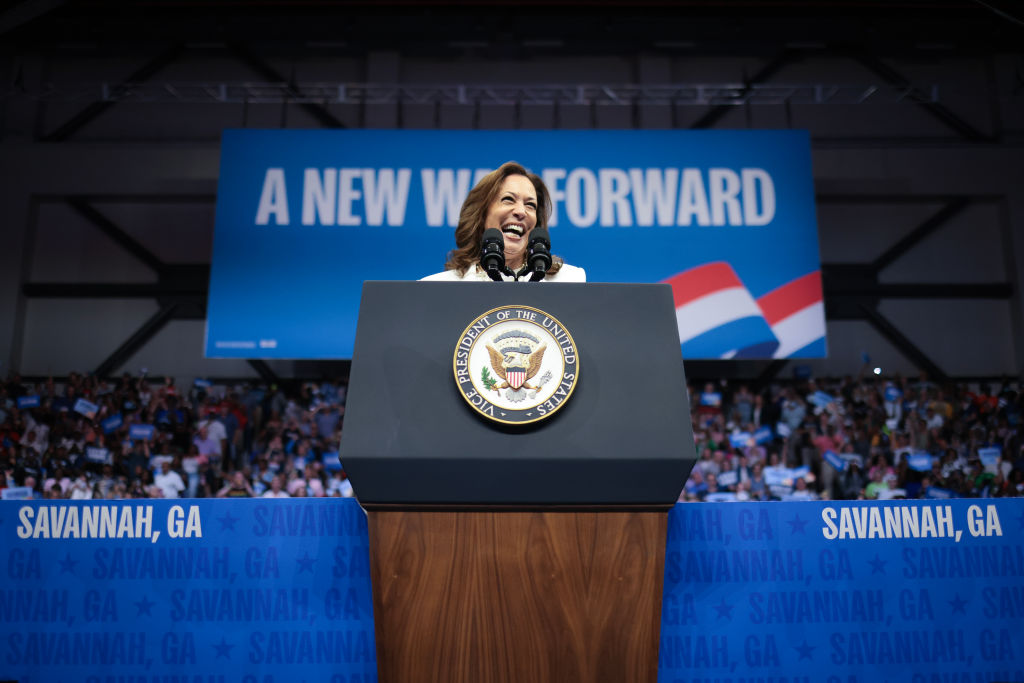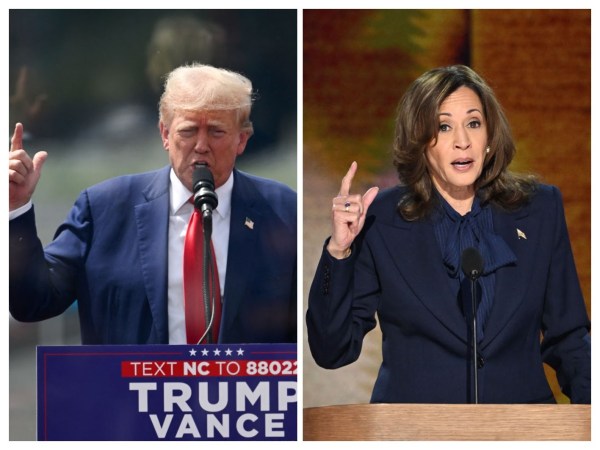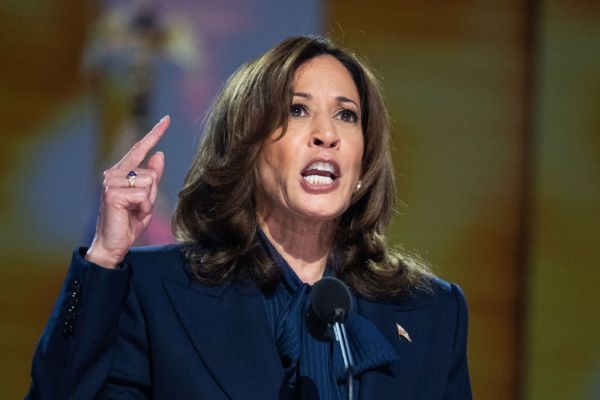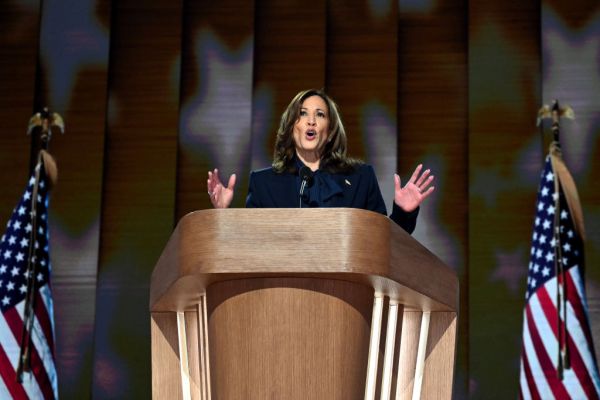Happy Friday! The crew here at The Dispatch is a pretty collegial bunch. But after reading about a Colorado man accidentally left on a mountain by his coworkers, we’re thinking we’ll skip a hike as the next company outing, for the sake of morale.
We’re going to skip Monday’s newsletter, too. Enjoy the long weekend, and we’ll see you right back here on Tuesday.
Quick Hits: Today’s Top Stories
- Vice President Kamala Harris—joined by her running mate, Minnesota Gov. Tim Walz—sat for her first interview since President Joe Biden dropped out of the presidential race, speaking Thursday with CNN’s Dana Bash in Georgia. Harris defended her statements to the American people following Biden’s dismal performance in the June 27 debate against former President Donald Trump, saying she didn’t regret saying Biden was strong, adding that he has “the intelligence, the commitment, and the judgment and disposition” to serve as president. However, she said it was time to “turn the page on the last decade”—which includes her three-and-a-half years as vice president—and embrace a “new era.” Harris seemed to commit to a continuation of Biden’s economic and foreign policy, particularly as it relates to Israel. Walz, for his part, said his “grammar isn’t always perfect” by way of explanation for his untrue claim that he carried “guns of war” in “war.”
- The Bureau of Economic Analysis (BEA) reported on Thursday that real gross domestic product (GDP) grew at an annual rate of 3 percent in the second quarter of this year, slightly more than the 2.8 percent the BEA had previously projected. The BEA said higher levels of consumer spending—as well as private inventory investment and nonresidential fixed investment—were the primary factors accounting for its GDP revised estimate.
- Ukrainian military officials confirmed on Thursday that one of the country’s U.S.-made F-16 fighter jets crashed and was destroyed on Monday while defending against a Russian missile aerial attack. Ukrainian officials announced investigations into the incident to determine the cause of the crash, which killed the pilot on board. Ukraine has a relatively small number of the U.S.-manufactured jets from Western allies, earlier this month receiving the first shipment of 80 F-16s NATO countries plan to send in support of its war effort.
- U.S. National Security Adviser Jake Sullivan met with Chinese President Xi Jinping on Thursday in a rare trip to Beijing to discuss communication between senior military leaders of both countries, trade policy and economic practices, counternarcotics efforts, and artificial intelligence, among other topics. After the meeting, Sullivan suggested the possibility of a call between Xi and President Joe Biden several weeks from now. Ahead of the election in November, Sullivan also said he told Chinese officials that Vice President Kamala Harris “shares” Biden’s view of the U.S. relationship with China. The high-level meeting in Beijing was an effort to diffuse tension between the two countries as the U.S. increases tariffs on Chinese goods and China acts more aggressively in the South China Sea and the Taiwan Strait.
- On the second day of its operation in the West Bank, the Israel Defense Forces (IDF) confirmed on Thursday it killed 12 terrorists in two West Bank cities—Jenin and Tulkarm—and arrested more than 10 other wanted terrorism suspects. The IDF claimed a Palestinian Islamic Jihad commander—26-year-old Abu Shujaa—was among the five killed in a Tulkarm mosque that Israeli officials said was used as a terrorist military headquarters and an explosives lab. The IDF targeted Shujaa for his involvement in several terrorist attacks, including one in June in the West Bank city of Qalqilya that killed a 67-year old Israeli civilian man.
- The United Nations World Food Programme (WFP) announced on Thursday it was temporarily pausing travel of agency staff in Gaza after one of its armed trucks was shot in by at least 10 bullets near an Israeli security checkpoint in the enclave. While no WFP employees were injured, the agency noted it was the first time a WFP vehicle sustained direct gunfire—but did not specify who fired at the international aid organization. The suspension effectively pauses humanitarian aid delivery and distribution in Gaza.
- A judge in Chinese Communist Party-governed Hong Kong convicted two journalists, Chung Pui-kuen and Patrick Lam, of sedition on Thursday, a crime for which the pair could face up to two years in prison. Pui-kuen and Lam were former editors of the Hong Kong-based online publication Stand News, which closed after authorities raided its offices, arrested its staff, and froze its assets in December 2021. The judge held that speech “must be stopped” when it “is deemed to have caused potential damage to national security and intends to seriously undermine the authority of the Chinese central government or the Hong Kong government.” U.S. State Department spokesperson Matthew Miller on Thursday called the conviction a “a direct attack on media freedom.”
- The U.S. Centers for Disease Control and Prevention (CDC) linked nine deaths—and 57 hospitalizations—to a recalled Boar’s Head liverwurst product that caused listeria bacteria infections, also known as listeriosis. The outbreak was traced back to a Boar’s Head food processing plant in Jarratt, Virginia, and has led the company to recall more than 7 million pounds of deli meat products produced at the facility. According to public documents obtained by the Associated Press, the Department of Agriculture identified 69 records of noncompliance with federal safety regulations at the plant in the last year—including as recently as July 27.
- A World Health Organization (WHO) official said on Thursday that Israel and Hamas had agreed to temporary combat pauses—separate from the ongoing ceasefire negotiations—in specific, limited regions in Gaza so that the international health agency can administer polio vaccines to Palestinians. The WHO plans to start administering vaccines to Palestinian residents on September 1, for the first of three separate three-day rollout phases.
- A Department of Justice Inspector General’s report published on Thursday found that the FBI often failed to appropriately respond to incidents of child sexual abuse, including insufficiently investigating complaints, failing to refer cases to the proper agency, not extending victim services to all eligible victims, and various other noncompliance violations. The inspector general found that 13 percent of the more than 300 incidents reviewed in the report “may require immediate attention,” and flagged those instances to FBI headquarters. “The FBI must appropriately handle all allegations of hands-on sex offenses against children it receives because failure to do so can result in children continuing to be abused and perpetrators abusing more children,” the report read. “We identified incidents where we believe the FBI did not appropriately respond to allegations involving hands-on sex offenses against children.”
Harris in the Hot Seat

Vice President Kamala Harris has spent much of her presidential campaign disavowing left-wing positions she’s held in the past. In her first major interview of the race, on Thursday evening with CNN’s Dana Bash, the vice president said that while her positions may have shifted, her “values have not changed.” One person’s flip-flops are another’s unwavering values.
Harris’ campaign has been very short—and so has her list of policy proposals. But in recent weeks, a clearer picture of her policy platform, one that is at least as progressive as President Joe Biden’s, has begun to emerge. It remains to be seen whether her focus on liberal economics and largely staying the course abroad will be electorally effective, particularly with moderates and independents.
In a campaign heavy on “vibes”—and “joy” as contrasted to “weirdness”—Harris has seemed in her general vagueness on policy to try to be everything to everyone. And she’s also moved away from potentially divisive positions. She affirmed on Thursday that she no longer favors a ban on fracking, as she did in the 2020 primaries. She’s also backed away from mandating electric vehicle usage, which was included in the Green New Deal resolution she co-signed in 2019, and decriminalizing illegal border crossings, which she endorsed during her prior presidential run. “We have laws that have to be followed and enforced that address and deal with people who cross our border illegally,” she said Thursday. “And there should be consequence.”
But Harris has unveiled her first defined set of domestic policy proposals, focused on bringing down the cost of living, this month. In her CNN interview, she said that these would be priorities on “day one” should she be elected. The policies target four areas that have seen prices rise quickly over the past four years: food, housing, health care, and child care.
Her proposal to address the increase in food prices is perhaps the most controversial: Harris proposed “the first-ever federal ban on price gouging on food,” a move immediately criticized by economists across the political spectrum.
The Harris campaign, however, was light on specifics. Her recent speech on the topic did not give enough detail to determine whether the proposed ban would be a price control—a set ceiling on prices for certain goods—or a ban on gouging—restricting the rate at which prices for a given good may rise.
The Harris campaign almost immediately attempted to tamp down talk of imposing price controls, telling reporters that the proposed law would not seek to set prices, but rather limit the ability of companies to raise prices during emergencies—as many state laws already do. Congressional Democrats also argued that her proposal would be modeled on a federal price-gouging bill introduced by Democratic Sen. Elizabeth Warren of Massachusetts earlier this year.
But Warren’s bill still grants the federal government very broad powers, banning “grossly excessive” price increases during any “atypical disruptions” of the market, while leaving it up to federal agencies to interpret exactly what those words mean. Harris, then, faces a paradox in defending her policy: It will either be like rarely invoked state-level legislation, and therefore have little effect on grocery prices, or it will be an enormously broad expansion of federal power into an arena where few economists believe it could have much upside.
On housing, Harris has sounded considerably more free-market—and been more detailed—though her plan isn’t without its market-manipulating risks. Harris pledged to bring down housing costs by boosting supply and demand. On the supply side, she proposed a tax credit for developers who build units aimed at first-time homebuyers, a $40 billion “innovation fund” for local governments seeking new ways to build affordable housing and working to eliminate “red tape and needless bureaucracy” that impedes construction—YIMBYs rejoice. To address demand, she proposed providing first-time homebuyers up to $25,000 in down-payment support, with even more support for first-generation homeowners.
In theory, it would be one of the most significant federal interventions in the housing market ever. The broad strategy behind the policy is clear, as liberal economics writer Noah Smith argued: Boosting supply and demand simultaneously, would theoretically treat housing as both a consumer good and financial investment, allowing housing prices to rise slowly as supply catches up.
The problem, as other policy analysts have noted, is that the federal government has relatively few tools to liberalize housing regulation, which is mostly decided by localities and, to a lesser extent, states. Harris’ plans risk boosting demand without increasing supply, according to many on-the-ground observers of local housing markets.
Other policy areas look more like a straightforward continuation of Biden administration priorities. Harris proposed to make permanent the temporary child tax credit expansion included in the American Rescue Plan, which would give families up to $3,600 per child, per year. She also proposed to increase the size of the tax credit to $6,000 for children in their first year of life. Biden endorsed versions of both policies earlier this year. Harris also wants to expand Biden policies aimed at lowering health care costs, by capping insulin prices at $35 and out-of-pocket costs for prescription drugs at $2,000 for all citizens, instead of only seniors, as Biden did.
But how much would all of this cost? According to an analysis by the nonpartisan Tax Foundation, the combined costs of Harris’ proposals would add up to over $2 trillion over 10 years, with the largest chunk by far being the child tax credit expansion, at $1.6 trillion dollars. When asked how she would finance her proposals, Harris has said the focus should be on the policies’ “return on investment.”
Of course, plans are one thing, but Harris has actually been in government. As Bash asked, “You’ve been vice president for three-and-a-half years. … Why haven’t you done [those policies] already?” Harris responded: “Well, first of all, we had to recover as an economy, and we have done that.” But her plans may also depend on a Congress that may or may not be willing to cooperate with her progressive domestic policy agenda—even if Democrats win back the House in the fall, Politico reports—making her Overton-window-shifting proposals more proof of bona fides than a realistic wish list.
If Harris’ economic proposals largely seem to be a continuation of Biden’s willingness to spend taxpayer dollars liberally, her foreign policy approach is less clear. Harris has some, though not much, foreign policy experience—she served on the Senate Intelligence Committee as a senator and has made diplomatic visits in her current role—but has yet to outline a clear worldview on global affairs. Harris has publicly served as an envoy for Biden’s foreign policy, which has strongly backed Ukraine, provided Israel with extensive diplomatic and military support, shored up alliances in the Pacific, and acted fairly aggressively toward China.
A Harris administration, however, might provide a stage on which intra-left-wing battles over America’s global role play out. Two of Harris’ top foreign policy advisers, Philip Gordon and Rebecca Lissner, have publicly argued for reevaluating U.S. strategy. Gordon has been a strong critic of U.S. Middle East policy and has been linked to experts who have ties to the Iranian government. Lissner co-wrote a book arguing that the United States must pull back from a “messianic” strategy of primacy and the “increasingly obsolete” liberal international order, in favor of a diplomacy-focused strategy of “openness” that makes peace with the rise of illiberal states like China, eschewing aggressive U.S. enforcement of liberal norms. Progressives who desire a reevaluation of strong U.S. leadership in the world may see encouragement in the presence of figures like Lissner and Gordon.
Progressives likely also understand that Harris probably won’t be a sharp break with Biden. “No one expects her to depart too much from the president,” said Matt Duss, who was Sen. Bernie Sanders’ foreign policy adviser until 2022 and now serves as executive vice president of the Center for International Policy, a progressive foreign policy think tank. “But there are ways in which she can talk about how she’s going to take a different approach.”
Harris has created a little distance from Biden on one foreign policy issue: Israel’s war in Gaza. Harris has shown a greater willingness than her boss to push back on some Israeli conduct. During Israeli Prime Minister Benjamin Netanyahu’s visit to the Capitol in July, Harris pointedly declined to preside over his address to Congress. However, she did attend a private meeting with Netanyahu, after which she said she would “always ensure that Israel is able to defend itself” but also “expressed with the prime minister my serious concern about the scale of human suffering in Gaza.”
Pro-Palestinian advocacy groups, however, were prominently snubbed at the Democratic National Convention last week. Harris may be signaling that her administration is less likely to give Israel as much leeway as Biden, but she also seems largely uninterested in placating the activist wing of her party.
Asked by Bash if she would “do anything differently” than Biden as it relates to Israel, Harris equivocated. She answered that “we have to get a deal done” and create “a two-state solution where Israel is secure and, in equal measure, Palestinians have security and self-determination and dignity.” She avoided saying definitively whether she would halt any weapons shipments to Israel.
Harris, then, has thus far offered more policy continuity from the Biden administration than change. But, in contrast to her very progressive domestic policy proposals, Harris has projected a mirage of moderation and normalcy during her campaign. Rob Stutzman, a political strategist who has run focus groups for independent group No Labels, argued that Harris had a chance to consolidate the votes of disaffected Republicans. The sort of voter who supported former U.N. Ambassador Nikki Haley in the Republican primary, Stutzman told TMD, had been moving away from Biden towards Trump, but would be “comfortable with returning to [the] institutional stability” that Harris seeks to project.
In particular, she’s avoided culture-war politics and race-based appeals: Her DNC acceptance speech was light on policy, emphasizing patriotism and unity and largely avoiding references to her race or gender—though a win in November would make her the country’s first female president and only the second person of color to hold the position. Asked about the historic nature of the race, Harris on Thursday called it “humbling.”
Very soon, however, Harris will have to respond to more hostile questions—not from a CNN anchor, but from her opponent, Donald Trump, during a presidential debate. For now, when asked about the former president’s attacks on her race, Harris simply said, “Next question, please.”
Worth Your Time
- For the New York Times, Megan Stack spoke with 38-year-old Salvadoran Nöe del Cid about the government’s crackdown on violence in the small Central American country. “In the two years since President Nayib Bukele unleashed his brutal crackdown on El Salvador’s gangs, most of the gangsters who once lorded over the neighborhood have been imprisoned, fled or gone into hiding, Mr. del Cid said. ‘He took the action that we needed him to take,’” Stack recounts. However, the costs of such action are hard to ignore. “[Del Cid] himself, he said, knew completely innocent people—he was sure—who were taken away by the police, and never came back. Their families are having a terrible time, he added ruefully. The police and military seemed to have abused their power, he suggested, or perhaps the investigations just weren’t careful enough. But then he looked back out at his quiet street. It had been so bad here, and for so long. … ‘We’re starting to feel security,” he said. “And security is what people want.’”
- Former independent candidate Robert F. Kennedy Jr.’s endorsement of former President Donald Trump is indicative of the “crank realignment” within the GOP, Matthew Yglesias argued for his Slow Boring Substack. “Trump himself, of course, used to be a Democrat. He switched parties in a blaze of birther conspiracy theories, and only then came to embrace conservative views on topics like gun control and abortion. And RFK Jr. was into election fraud conspiracy theories long before January 6, but his version was about George W. Bush stealing the 2004 election in Ohio,” Yglesias wrote. “Twenty years later, that’s no longer the case. … The partisan shifts of both Trump and RFK Jr. are part of a long term cycle in which educated professionals have gravitated toward the Democratic Party coalition and a generic suspicion of institutions and the people who run them has come to be associated with conservative politics. … The problem is that this hasn’t actually changed the fact that lots of people are dumb cranks; it’s simply created a Dumb Crank Party. And on balance, I think that has eroded the epistemic quality of both coalitions.”
Presented Without Comment
Former President Donald Trump, discussing his position on in-vitro fertilization (IVF) in an interview with NBC News:
Trump: As you know, I was always for IVF, right from the beginning, as soon as we heard about it. It’s fertilization, it’s helping women and men and families. But it’s helping women able to have a baby. Some have great difficulty and a lot of them have been very happy with the results, as you know. And what we’re doing—and we’re doing this because we just think it’s great and we need great children, beautiful children in our country. We actually need them. And we are going to be, under the Trump administration, we are going to be paying for that treatment. So we are paying for that treatment—
Dasha Burns: All Americans who want it?
Trump: All Americans that get it. All Americans that need it. So we’re going to be paying for that treatment or we’re going to be mandating that the insurance company pay.
Also President Without Comment
Vice President Kamala Harris, asked by CNN’s Dana Bash whether she would appoint a Republican to her Cabinet:
Bash: Will you appoint a Republican to your Cabinet?
Harris: Yes, I would.
Bash: Any one in mind—
Harris: Yes, I would. No, no one in particular in mind. I got—we got 68 days to go with this election, so I’m not puttin’ the cart before the horse. But I would. I think—I think it’s really important. I—I have spent my career inviting diversity of opinion. I think it’s important to have people at the table when some of the most important decisions are being made that have different views, different experiences. And I think it would be to the benefit of the American public to have a member of my Cabinet who is a Republican.
In the Zeitgeist
It’s frankly not a stretch to think that The Dispatch’s office league softball team has more base-running IQ than the Washington Nationals displayed earlier this week as they served up an absolutely bizarre double play for the Yankees.
Toeing the Company Line
- In the newsletters: Sarah and Mike dig into the revamped Jack Smith indictment of former President Donald Trump in The Collision, Will explains why self-driving cars have been slower to hit the road than expected, and Nick argued (🔒) that questions of whether Trump’s stunt at Arlington National Cemetery was legal distract from whether it was ethical.
- On the podcasts: Megan McArdle joins Sarah, Jonah, and Steve on The Dispatch Podcast roundtable to discuss the Dispatch v. Bulwark spat.
- On the site: Kevin notes that congressional Democrats are making a funny argument about gridlock ahead of the election and Joseph Polidoro explains the complexities of different fertility treatments.
Let Us Know
Did you watch Harris’ interview? If so, what did you make of her performance?












Please note that we at The Dispatch hold ourselves, our work, and our commenters to a higher standard than other places on the internet. We welcome comments that foster genuine debate or discussion—including comments critical of us or our work—but responses that include ad hominem attacks on fellow Dispatch members or are intended to stoke fear and anger may be moderated.
With your membership, you only have the ability to comment on The Morning Dispatch articles. Consider upgrading to join the conversation everywhere.